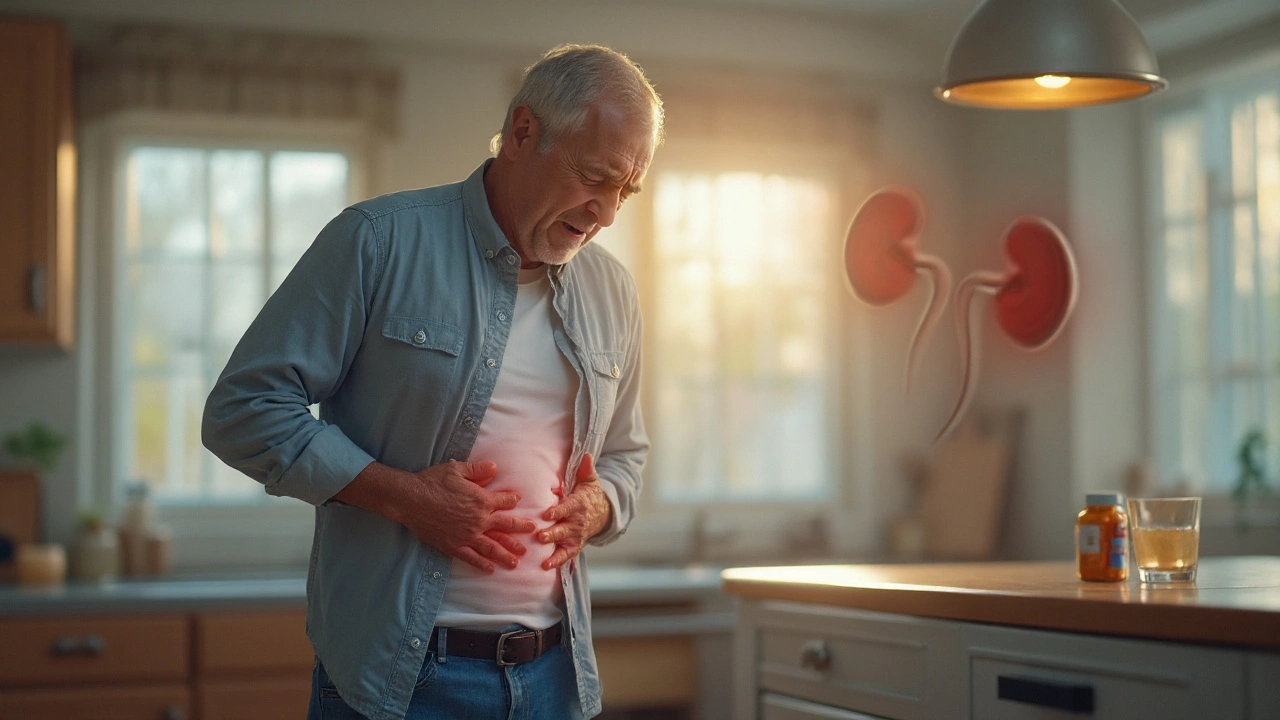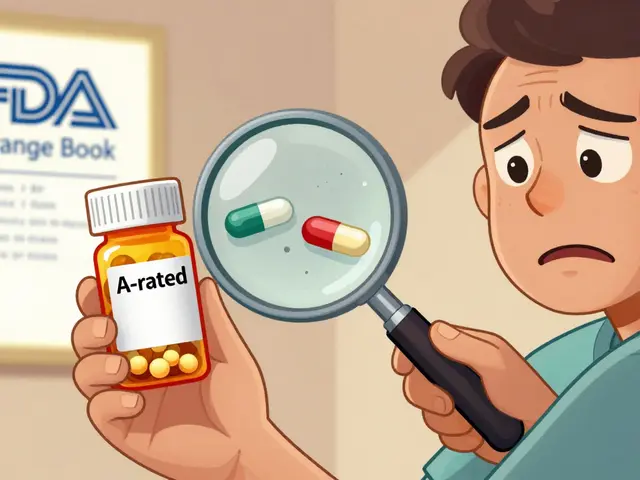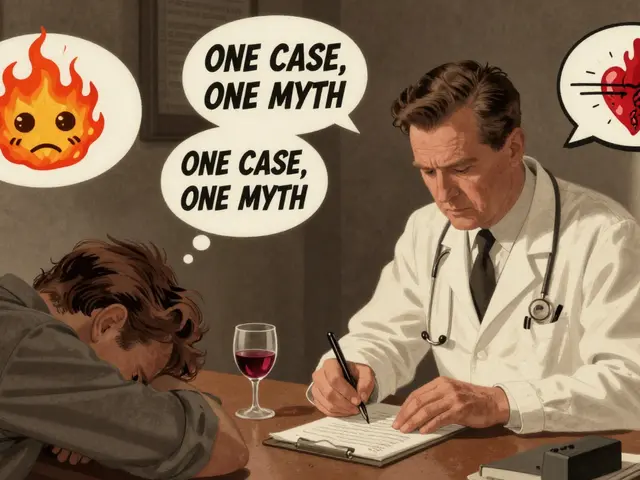
Vomiting and kidney disease is a clinical link where persistent nausea and forceful expulsion of stomach contents often signal worsening renal function. Understanding this connection helps patients and clinicians intervene before dehydration, electrolyte chaos, or hospital admission becomes unavoidable.
Why does vomiting show up in kidney problems?
Kidneys filter waste, balance fluids, and keep electrolytes in check. When they falter, toxic substances such as uremic toxins waste products that accumulate when glomerular filtration drops spill into the bloodstream. The brain’s vomiting center reacts to these chemicals much like it does to alcohol or chemotherapy agents.
Two common culprits are electrolyte imbalances abnormal levels of sodium, potassium, calcium, or phosphate and excess fluid that irritates the stomach lining. Both conditions can trigger the nausea‑vomiting reflex within minutes of a lab value shifting.
Key kidney conditions linked to vomiting
Not all kidney disease behaves the same. The two main forms-Acute Kidney Injury (AKI) a sudden drop in kidney function over hours to days and Chronic Kidney Disease (CKD) a progressive loss of renal performance over months to years-show distinct vomiting patterns.
AKI often follows a binge of ibuprofen, severe dehydration, or a sudden blockage. Patients may vomit early, before labs even show a dramatic rise in creatinine. CKD, on the other hand, produces a low‑grade, persistent nausea that worsens as the estimated glomerular filtration rate (eGFR) slips below 30mL/min.
Comparing AKI and CKD vomiting profiles
| Feature | Acute Kidney Injury | Chronic Kidney Disease |
|---|---|---|
| Onset | Hours-days after insult | Months-years after disease progression |
| Frequency | Intermittent, often linked to fluid shifts | Daily or multiple times per day |
| Associated labs | Sharp rise in creatinine, BUN, potassium | Gradual rise in BUN/creatinine, persistent hyperphosphatemia |
| Reversibility | Potentially full recovery with prompt treatment | Progressive; symptom control is primary goal |
| Treatment focus | Fluid resuscitation, toxin removal, avoid nephrotoxins | Dialysis, dietary sodium/potassium restriction, anti‑emetics |
How clinicians diagnose vomiting related to kidney disease
First, a thorough history pinpoints triggers-new meds, recent infections, or dietary changes. A physical exam looks for signs of fluid overload (edema, lung crackles) or dehydration (dry mucous membranes).
Lab work is the backbone. Serum creatinine a waste product that rises when kidneys filter less efficiently and blood urea nitrogen (BUN) give a snapshot of filtration. Electrolyte panels reveal potassium spikes or sodium dips, both hunger triggers for the vomiting reflex.
Imaging-usually renal ultrasound-helps rule out obstruction, a common AKI source. In CKD patients, the presence of an enlarged or shrunken kidney on ultrasound informs disease stage.

Treatment pathways: from meds to dialysis
Therapy starts with the cause. If dehydration is the culprit, gentle IV fluids restore volume without overloading the heart. For electrolyte chaos, targeted replacements (e.g., potassium‑binding resins) correct the imbalance.
When nausea persists, clinicians turn to anti‑emetic medication drugs that blunt the brain’s vomiting center, such as ondansetron or metoclopramide. These agents are chosen based on kidney clearance; some require dose reduction in advanced CKD.
For patients with refractory symptoms and a high uremic load, dialysis a mechanical process that filters blood when kidneys can’t often resolves nausea within a few sessions. Peritoneal dialysis offers a gentler option for those who cannot tolerate rapid fluid shifts.
Dietary tweaks also matter. Limiting high‑phosphate foods and protein spikes can reduce uremic toxin production. Small, frequent meals replace large meals that overburden a sluggish stomach.
Living with kidney disease: lifestyle tips to curb vomiting
- Stay hydrated, but avoid gulping large volumes in one go-sip slowly.
- Monitor weight daily; sudden gains may signal fluid overload.
- Keep a symptom diary noting triggers, meal composition, and medication changes.
- Ask your nephrologist about low‑phosphate, low‑potassium meal plans.
- Schedule regular labs-especially electrolytes-so adjustments happen before nausea hits.
These habits empower patients to catch early warning signs, reducing emergency visits.
Related concepts you might explore next
Understanding the vomiting-kidney link opens doors to several adjacent topics: renal osteodystrophy (bone changes from phosphate imbalance), hyperkalemia management, dialysis access care, and nephrotoxic drug avoidance. Each of these areas deepens the picture of how kidneys affect whole‑body health.
Frequently Asked Questions
Why does my stomach feel queasy when my kidney numbers get worse?
When the kidneys fail, waste molecules such as urea and creatinine rise, irritating the brain’s vomiting center. Electrolyte swings and fluid overload add extra stress, making nausea a common early signal.
Is vomiting always a sign of acute kidney injury?
Not always. Acute kidney injury often brings sudden vomiting, but chronic kidney disease can cause a low‑grade, persistent nausea. Other causes-gastroparesis, infections, medications-must also be ruled out.
Can anti‑emetic drugs harm my kidneys?
Most anti‑emetics are safe when dose‑adjusted for renal function. For example, ondansetron requires a lower dose in eGFR below 30mL/min, while metoclopramide is cleared largely by the liver and is usually okay.
When should I consider dialysis to stop vomiting?
If nausea persists despite fluid management, electrolyte correction, and anti‑emetics, and labs show uremic toxin levels (BUN > 80mg/dL) or refractory hyperkalemia, dialysis is usually recommended.
Are there home remedies that help reduce vomiting in kidney disease?
Ginger tea, small frequent meals, and staying upright after eating can ease mild nausea. However, any home approach should be discussed with a nephrologist to avoid hidden potassium or phosphate sources.
9 Comments
Michael Dion
September 30, 2025 at 15:12 PM
Sounds like a lot of medical jargon
Trina Smith
October 9, 2025 at 06:12 AM
Understanding how kidney dysfunction triggers nausea requires looking at the build‑up of waste products in the blood. As the glomerular filtration rate declines, urea and creatinine accumulate, stimulating the area postrema in the brain. This subtle signaling can start as a vague queasiness, then progress to full‑blown vomiting if left unchecked 😊. Electrolyte imbalances, especially high potassium or low sodium, further aggravate the reflex. It’s also important to consider the patient’s fluid status-both dehydration and overload can exacerbate symptoms. Keeping a symptom diary can help pinpoint the exact triggers and guide timely interventions. Regular lab monitoring is essential, as it catches the silent shifts before they become catastrophic. In short, the kidneys and the stomach are in a delicate dance, and when one falters, the other feels the rhythm. 🌟
josh Furley
October 17, 2025 at 21:12 PM
Actually, the link isn’t that simple-there’s also a role for cytokine storms and uremic neuropathy 😐. Simple vocab can’t capture the pharmacokinetic jargon, but the gist is that toxins plus electrolyte chaos equal vomit. So don’t just blame the kidneys alone; look at meds, infections, and diet too. 🤔
Jacob Smith
October 26, 2025 at 11:12 AM
Hey, don’t get discouraged-you’re doing great! Keep tracking those labs and stay on top of fluids, u’ll see improvements. Small, frequent meals are key, and remember, the nurse team is there to help you manage those electrolytes. You’ve got this, keep pushing forward!
Chris Atchot
November 4, 2025 at 02:12 AM
I must point out that “uremic” is an adjective describing toxins associated with renal failure; therefore, the phrase “uremic toxins” is perfectly acceptable, not redundant!!! Also, the term “vomiting centre” should be hyphenated as “vomiting‑centre” when used as a compound noun in British English, though American style often omits the hyphen!!! Keep up the excellent research, and thank you for sharing such a comprehensive overview!!!
Shanmugapriya Viswanathan
November 12, 2025 at 17:12 PM
Everyone seems to think this is just a “medical curiosity,” but anyone who knows Indian Ayurvedic principles understands that kidney health is the foundation of overall wellbeing :) . The western approach ignores the holistic balance of doshas, which is why patients often remain symptomatic despite dialysis. It’s time we integrate traditional knowledge with modern nephrology for real results :) .
Rhonda Ackley
November 21, 2025 at 08:12 AM
The moment I first read about the relentless cycle of vomiting tied to failing kidneys, I felt a pang of sympathy that quickly turned into a full‑blown cinematic vision of patients battling invisible demons inside their bodies! Imagine, if you will, the delicate filtration units-those kidneys-working tirelessly like hidden custodians, only to be overwhelmed by a torrent of toxins that surge like an unforgiving tide. Each wave of uremic waste crashes against the fragile gut lining, sending shockwaves straight to the brain’s vomiting centre, and the poor patient is left clutching their stomach as if it were a lit fuse about to explode! One cannot merely glance at a lab value and think, “Oh, it’s just a number,” because those numbers whisper stories of sodium drifting low, potassium climbing high, and phosphate building barricades that no mere diet can breach. The drama intensifies when fluid overload presses against the lungs, turning a simple breath into a laborious struggle, while dehydration simultaneously strips away the body’s ability to temper these assaults. Doctors, in their white coats, scramble to balance IV fluids-too much, and the heart quivers; too little, and the kidneys gasp for life‑saving blood. Meanwhile, patients endure the cruel irony of anti‑emetics that must be dosed carefully, lest the very medicine meant to soothe becomes a new source of toxicity. And then, as if the heavens themselves conspire, dialysis looms like a mechanical leviathan, promising relief, yet demanding an admission to the cold, humming halls of the clinic. Each session whispers promises of “no more nausea,” but the reality is a complex dance of shifting electrolytes that can reignite the queasy chorus at any moment. The narrative does not end there-home remedies like ginger tea or small, frequent meals offer fleeting solace, like brief interludes between acts of a tragic play. Yet, without rigorous monitoring and a steadfast commitment to dietary restrictions, these soporific measures wane like candlelight in a storm. In the grand tapestry of renal care, vomiting is not merely a symptom; it is a herald, a dramatic announcer that something deep within the body cries out for balance. It is a reminder that every organ, every molecule, sings in harmony-or else discord erupts in the most visceral ways. So, dear readers, as you navigate this labyrinth, remember that patience, vigilance, and a touch of compassion are the true protagonists in this saga. And perhaps, just perhaps, through shared stories and collective empathy, we can rewrite the ending from one of endless suffering to one of hopeful resilience.
Sönke Peters
November 29, 2025 at 23:12 PM
Monitoring labs regularly is the best preventive step.






Rebecca Bissett
September 22, 2025 at 00:12 AM
When the kidneys start to fail, the body floods with uremic toxins!!! The brain’s vomiting centre gets hit hard!!! Sodium and potassium swings turn your stomach into a battlefield!!! Even a tiny dip in eGFR can unleash relentless nausea!!! Hydration levels drop, electrolytes go haywire, and you end up vomiting like there’s no tomorrow!!! It’s not just the toxins; fluid overload presses on the stomach lining, screaming for relief!!! The cascade is brutal, and if you don’t catch it early, dehydration will grab you by the throat!!!